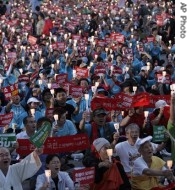VOA标准英语2008年-N. Koreans Face Famine, Applause South's US Bee
时间:2019-01-16 作者:英语课 分类:VOA标准英语2008年(六月)
By Kurt Achin
Seoul
13 June 2008
North Korea's official news media have recently been praising South Korean anti-U.S. beef protests, describing them as a popular struggle against a "traitor 1" president. But as VOA's Kurt Achin reports from Seoul, the protests hold both irony 2 and lessons for North Koreans.

South Korean protesters shout slogans during a candlelight rally against US beef imports in Seoul, 13 Jun 2008
North Korea's Central News Agency has been expressing solidarity 3 recently with the South Korean protesters. The reports deride 4 South Korean President Lee Myung Bak as a "begging president" who acts as a "puppet" to the United States, and says his administration has been "sentenced to death" by the popular struggle.
Ryoo Kihl-jae, a Dean at Kyungnam University of North Korean Studies in Seoul, says the protests are useful for the North's propaganda.
He says the North is enjoying the fact that the Lee administration is, as he puts it, "on fire." In addition to displaying its enjoyment 5, he says, the news releases are a way to show Pyongyang's displeasure at Mr. Lee's North Korea policies.
President Lee has taken a much stiffer line on North Korean aid than his two previous predecessors 6. North Korea has frequently rebuked 7 Lee for what its media describes as straying from the spirit of the historic North-South summit in 2000.
However, Professor Ryoo points out North Korea is very selective in its coverage 8 of the South's protests.
He says the North does not provide many details about the protests to its people-- choosing to portray 9 them one-dimensionally, as an anti-Lee movement. He says if Pyongyang provided too many details about the protest, it might make North Koreans contemplate 10 their own anger against their government.
North Korea has one of the most repressive authoritarian 11 governments on the planet. Jang In Suk, a North Korean in her 60s who defected to the South about ten years ago, says protests like the ones in Seoul would be utterly 12 inconceivable back home.
She says anyone who talks back to the North Korean government winds up dead, so citizens there do not even dream about protesting. She says, she wants to tell North Koreans that people in the South are like kings - they can speak out, protest, and publish. Such things are theoretically guaranteed in the North's constitution, but have no existence in reality.
North Koreans may perceive another ironic 13 subtext in the South's protests, that South Koreans can afford a lengthy 14 fight about how to indulge their consumption of beef. Most ordinary North Koreans have not tasted or seen beef from any nation for decades. Aid groups warn the North is teetering on the brink 15 of its second famine in ten years, unless it receives donations of corn and other basic grains.
Cha Sung-Ju, a North Korean defector in his 40s, represents the Committee for the Democratization of North Korea in Seoul. He says it is unfortunate that most South Koreans become so emotive about the beef issue, but remain apathetic 16 about suffering in the North.
He says millions of people are dying of starvation and suffering under dictatorship in the North. He says the hundreds of thousands who have joined the candlelight protests in Seoul have probably never lifted a candle for North Koreans.
- The traitor was finally found out and put in prison.那个卖国贼终于被人发现并被监禁了起来。
- He was sold out by a traitor and arrested.他被叛徒出卖而被捕了。
- She said to him with slight irony.她略带嘲讽地对他说。
- In her voice we could sense a certain tinge of irony.从她的声音里我们可以感到某种讥讽的意味。
- They must preserve their solidarity.他们必须维护他们的团结。
- The solidarity among China's various nationalities is as firm as a rock.中国各族人民之间的团结坚如磐石。
- Some critics deride the group as self - appointed food police.一些批评人士嘲讽这个组织为“自封的食品警察”。
- They deride his effort as childish.他们嘲笑他的努力,认为太孩子气。
- Your company adds to the enjoyment of our visit. 有您的陪同,我们这次访问更加愉快了。
- After each joke the old man cackled his enjoyment.每逢讲完一个笑话,这老人就呵呵笑着表示他的高兴。
- The new government set about dismantling their predecessors' legislation. 新政府正着手废除其前任所制定的法律。 来自《简明英汉词典》
- Will new plan be any more acceptable than its predecessors? 新计划比原先的计划更能令人满意吗? 来自《简明英汉词典》
- The company was publicly rebuked for having neglected safety procedures. 公司因忽略了安全规程而受到公开批评。
- The teacher rebuked the boy for throwing paper on the floor. 老师指责这个男孩将纸丢在地板上。
- There's little coverage of foreign news in the newspaper.报纸上几乎没有国外新闻报道。
- This is an insurance policy with extensive coverage.这是一项承保范围广泛的保险。
- It is difficult to portray feelings in words.感情很难用言语来描写。
- Can you portray the best and worst aspects of this job?您能描述一下这份工作最好与最坏的方面吗?
- The possibility of war is too horrifying to contemplate.战争的可能性太可怕了,真不堪细想。
- The consequences would be too ghastly to contemplate.后果不堪设想。
- Foreign diplomats suspect him of authoritarian tendencies.各国外交官怀疑他有着独裁主义倾向。
- The authoritarian policy wasn't proved to be a success.独裁主义的政策证明并不成功。
- Utterly devoted to the people,he gave his life in saving his patients.他忠于人民,把毕生精力用于挽救患者的生命。
- I was utterly ravished by the way she smiled.她的微笑使我完全陶醉了。
- That is a summary and ironic end.那是一个具有概括性和讽刺意味的结局。
- People used to call me Mr Popularity at high school,but they were being ironic.人们中学时常把我称作“万人迷先生”,但他们是在挖苦我。
- We devoted a lengthy and full discussion to this topic.我们对这个题目进行了长时间的充分讨论。
- The professor wrote a lengthy book on Napoleon.教授写了一部有关拿破仑的巨著。
- The tree grew on the brink of the cliff.那棵树生长在峭壁的边缘。
- The two countries were poised on the brink of war.这两个国家处于交战的边缘。